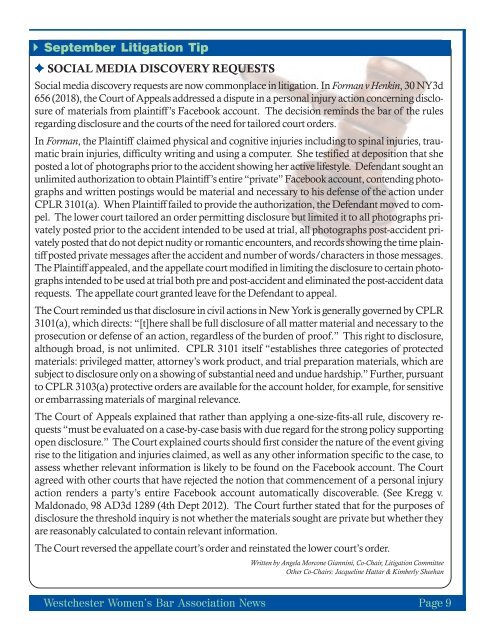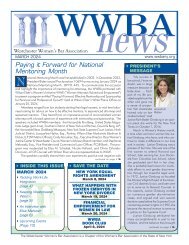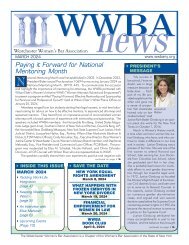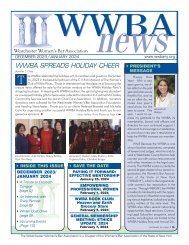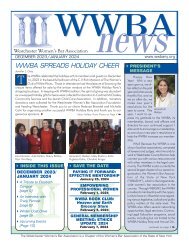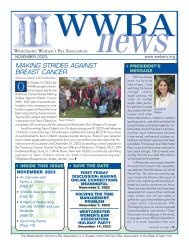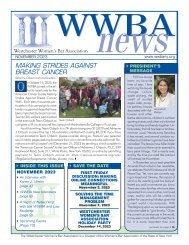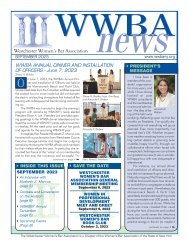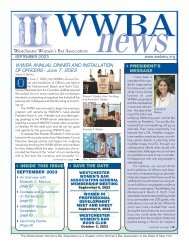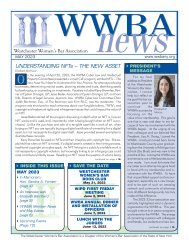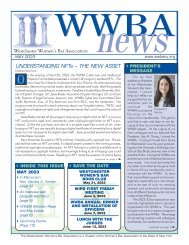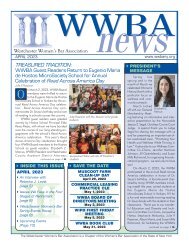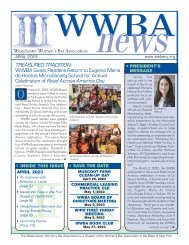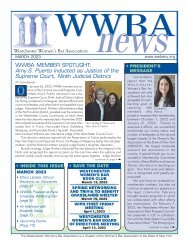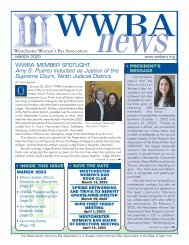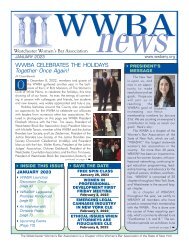WWBA September 2018 Newsletter
Create successful ePaper yourself
Turn your PDF publications into a flip-book with our unique Google optimized e-Paper software.
<strong>September</strong> Litigation Tip<br />
✦ SOCIAL MEDIA DISCOVERY REQUESTS<br />
Social media discovery requests are now commonplace in litigation. In Forman v Henkin, 30 NY3d<br />
656 (<strong>2018</strong>), the Court of Appeals addressed a dispute in a personal injury action concerning disclosure<br />
of materials from plaintiff’s Facebook account. The decision reminds the bar of the rules<br />
regarding disclosure and the courts of the need for tailored court orders.<br />
In Forman, the Plaintiff claimed physical and cognitive injuries including to spinal injuries, traumatic<br />
brain injuries, difficulty writing and using a computer. She testified at deposition that she<br />
posted a lot of photographs prior to the accident showing her active lifestyle. Defendant sought an<br />
unlimited authorization to obtain Plaintiff’s entire “private” Facebook account, contending photographs<br />
and written postings would be material and necessary to his defense of the action under<br />
CPLR 3101(a). When Plaintiff failed to provide the authorization, the Defendant moved to compel.<br />
The lower court tailored an order permitting disclosure but limited it to all photographs privately<br />
posted prior to the accident intended to be used at trial, all photographs post-accident privately<br />
posted that do not depict nudity or romantic encounters, and records showing the time plaintiff<br />
posted private messages after the accident and number of words/characters in those messages.<br />
The Plaintiff appealed, and the appellate court modified in limiting the disclosure to certain photographs<br />
intended to be used at trial both pre and post-accident and eliminated the post-accident data<br />
requests. The appellate court granted leave for the Defendant to appeal.<br />
The Court reminded us that disclosure in civil actions in New York is generally governed by CPLR<br />
3101(a), which directs: “[t]here shall be full disclosure of all matter material and necessary to the<br />
prosecution or defense of an action, regardless of the burden of proof.” This right to disclosure,<br />
although broad, is not unlimited. CPLR 3101 itself “establishes three categories of protected<br />
materials: privileged matter, attorney’s work product, and trial preparation materials, which are<br />
subject to disclosure only on a showing of substantial need and undue hardship.” Further, pursuant<br />
to CPLR 3103(a) protective orders are available for the account holder, for example, for sensitive<br />
or embarrassing materials of marginal relevance.<br />
The Court of Appeals explained that rather than applying a one-size-fits-all rule, discovery requests<br />
“must be evaluated on a case-by-case basis with due regard for the strong policy supporting<br />
open disclosure.” The Court explained courts should first consider the nature of the event giving<br />
rise to the litigation and injuries claimed, as well as any other information specific to the case, to<br />
assess whether relevant information is likely to be found on the Facebook account. The Court<br />
agreed with other courts that have rejected the notion that commencement of a personal injury<br />
action renders a party’s entire Facebook account automatically discoverable. (See Kregg v.<br />
Maldonado, 98 AD3d 1289 (4th Dept 2012). The Court further stated that for the purposes of<br />
disclosure the threshold inquiry is not whether the materials sought are private but whether they<br />
are reasonably calculated to contain relevant information.<br />
The Court reversed the appellate court’s order and reinstated the lower court’s order.<br />
Written by Angela Morcone Giannini, Co-Chair, Litigation Committee<br />
Other Co-Chairs: Jacqueline Hattar & Kimberly Sheehan<br />
Westchester Women’s Bar Association News<br />
Page 9


